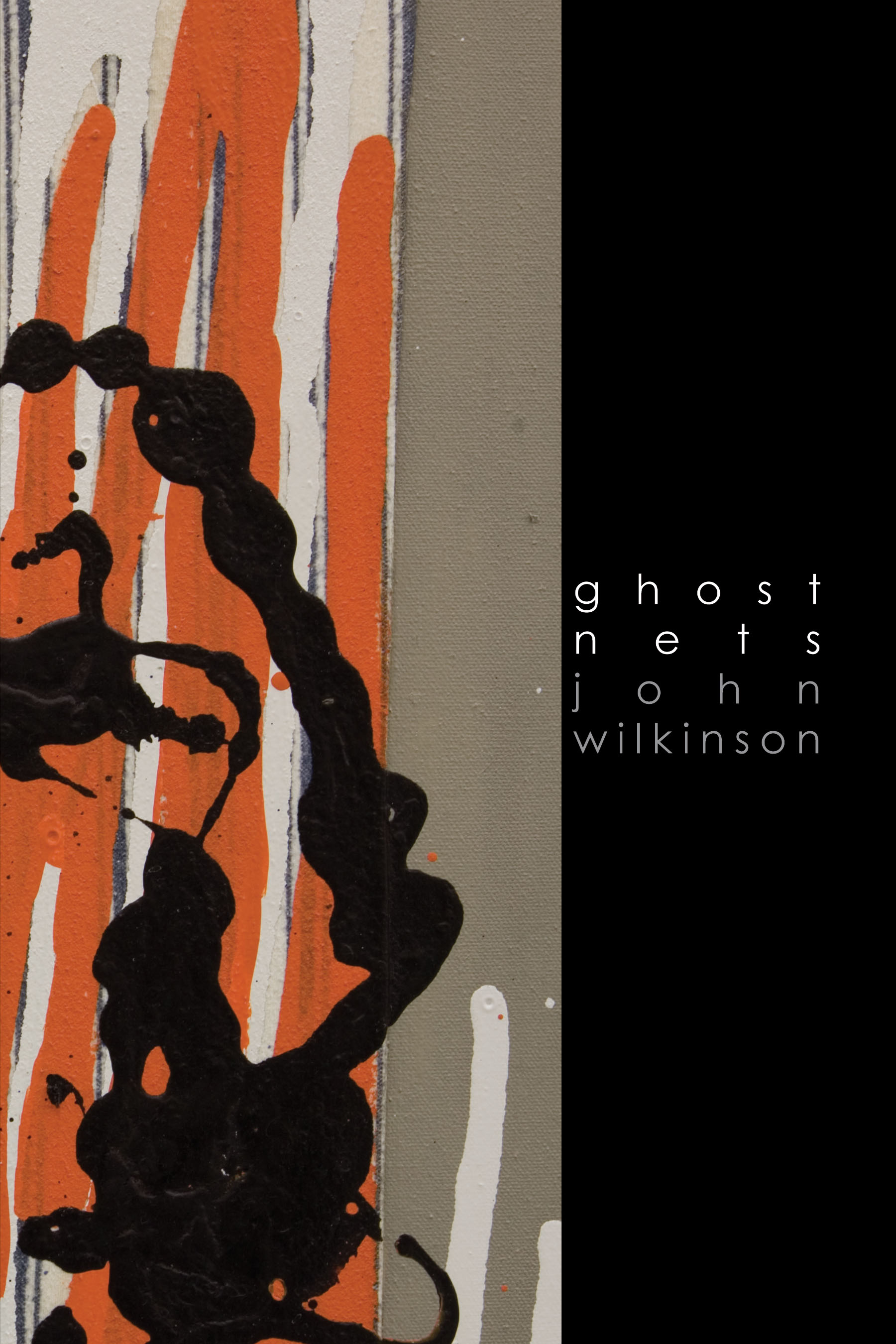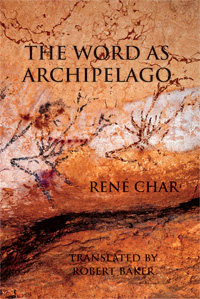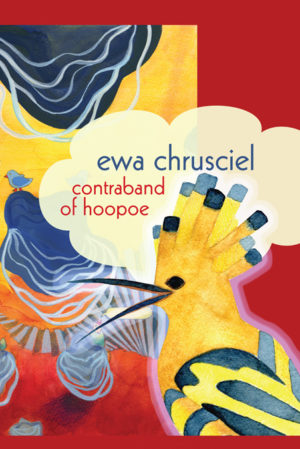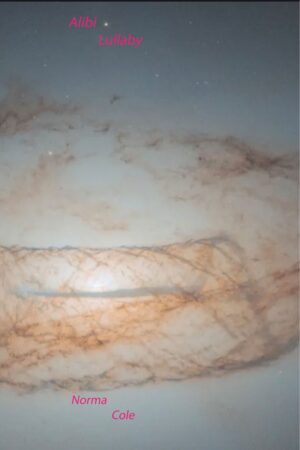Description
Ghost Nets is the first US collection by John Wilkinson, and collects poems written after his move across the Atlantic in 2005 with the exception of the previously-published book-length works Down to Earth and Reckitt’s Blue. Ranging from brief lyrics to elaborately-structured long poems, the collection displays the intense musicality, syntactical intricacy and affective power characteristic of his poetry. But the political, social and economic crises of the period in the US shape Wilkinson’s writing in new ways, more vulnerable and more evidently responsive to others’ vulnerability.
In writing this stunning volume, John Wilkinson begins with a phrase, ghost nets. The phrase is not empty of real life meaning; ghost nets are, according to Wikipedia, “fishing nets that have been left or lost in the ocean by fishermen. These nets, often nearly invisible in the dim light, can be left tangled on a rocky reef or drifting in the open sea.” They are dangerous things, at least for marine life. But what they ensnare, they contain—that can be, and perhaps always is, valuable, beautiful, and worthy of our most careful attention. And so it is that the poems in Ghost Nets can be read as forms “in the dim light,” catching bits of language, reference, significance afloat in the abyssal culture. The result is not so much an accumulation as a sequence of entanglements, fraught but utterly exquisite, thanks to the sublime intelligence (Wilkinson’s, and also poetry’s) with which the entangled elements—physical, psychological, intellectual, social, political, atmospheric—are acknowledged. To read these works is to follow the drift, drag, and draw of the poems—ghost nets, sad in themselves but not by virtue of what they contain. That is inspiriting, inspiring.
Lyn Hejinian, author of THE UNFOLLOWING
As a long time admirer of John Wilkinson’s poetry, I cheer the arrival of Ghost Nets (his first US book). Wilkinson’s intelligence nettles, yet his compassion soothes. From insidious microorganisms to macroeconomic abuses these poems offer ethical reflections of the now and in so doing bring the “ambient usual” to heel. Wilkinson is a master of syntax and his diction, well, yes, will drive you to the dictionary, but what better place to be? Here we see nature unfaced by industry, yet a droplet of water works its “green stealth.” Check out “Unicorn Bait”—it’s a masterpiece!
Jennifer Moxley, author of THE OPEN SECRET
Ghost Nets gathers up a selection of some of John Wilkinson’s most careful, powerful verse. Moving from a kind of environmental or intellectual-pastoral mode, that is, closely observing and valuing everything – a herbarium of ideas; hiberniculum of attentions! – through poems of war, love, death, the everyday mercilessness of advanced capitalism, Wilkinson’s poetry traces personal-psychological Thought in the real-time political and vice versa. It does so in a language that is microscopically detailed, yet formally and musically substantial: a substance to swim in, one that has helped usher in a contemporary Renaissance in English poetry (meanwhile, Shakespearean echoes are just some of the ghosts caught in these nets). Simultaneously, impossibly, there’s delicacy and restraint to the ‘song husks’ that get made this way: this is endearing stripping. Ethereal ‘figments’ suggest a kind of afterimage beside each word-moment, and an ‘afterlife unfolds behind a hooked moon’ – that stays with and changes you. I love this poetry so much!
Emily Critchley, author of OUT OF EVERYWHERE 2: Linguistically innovative poetry by women in North America & the UK
About the Author
Reviews
Excerpt
John Wilkinson is a British poet who has had two distinct careers, in mental health services in the UK as a nurse, social worker, and policy maker, and subsequently as a university teacher in the US where he now chairs Creative Writing and Poetics at the University of Chicago. In historical, critical and reference works, John Wilkinson’s writing has come to be treated as a major force in recent British poetry.
A brief interview with John Wilkinson
conducted by Rusty Morrison
Omnidawn is enormously privileged to be publishing the first book of yours to be brought out by a U.S. publisher. You are highly esteemed as poet and critic in the U.K., a career that began forty (!!!) years ago with your first book, USEFUL REFORMS. The critic Andrea Brady suggests that there has been a marked consistency in your work over the span of books, while scholar Robin Purves astutely probes the “value of inconsistency” in your work at the level of line, stanza, and section. In his essay “The Value of Inconsistency,” Purves quotes extensively from “The Metastasis of Poetry,” in which you discuss the “metastatic” elements in your work and explain that your poems “exhibit…not a metaphorical development, but a set of linked and transforming entities, which can be syntactical gestures, vowel and consonant patterning, imagistic or discursive modes. ‘Metastasis’ is a term in rhetoric, but my use derives from a brief experience of nursing in a cancer hospice, the way metastatic tumours echo about the body and these nodes define the shape of the body subjectively, through the pain.” Would you speak to your sense of the evolution of your writing up to the point of GHOST NETS? And, would you comment on how GHOST NETS—in its formal elements, in its work at the level of the phrase, the line, the stanza, the larger section of a poem—exposes both consistency and inconsistency within the text itself, and with respect to your past works? Also, if you’d care to reference metastasis, I’d be delighted.
Writers like to regard every book as a sharp departure from their previous work, I suppose – why should anyone who doesn’t rely on writing for an income, continue to write if not to some extent in reaction against previous writing, as well as reacting to recent reading and events that put some kind of pressure on life and writing. But when I look at my writing over the duration, as my recent selected poems, Schedule of Unrest forced me to do, well, I can’t shut my eyes to the dread consistencies. At one time I obsessively avoided repeating myself and was taken aback, in my early thirties, to be asked why my poems so often featured air conditioners. That was an interesting question, recognizing a diagnostic sign. Given the length of my writing life it would take a lot of time and thought to respond fully to this question, but perhaps now some poems are more intricate – ‘Courses Matter-Woven’ drove me half-crazy to pleat – and some poems are more improvised – and all of them may be clearer about what they are doing, which may or may not be a good thing (it comes from being asked to explain myself in an academic culture).
Formally, Ghost Nets is extremely various, ranging from short lyrics through continuous long poems such as ‘Ode at the Gate of the Gathering’ to serial poems. Partly this reflects the fact that the poems were written across a decade, during which I also wrote or completed two books I’ve already published; these were Down to Earth, a single work concerned with the global circulation of goods, peoples, and gases, and Reckitt’s Blue, a set of serial poems in contrasting idioms prompted by very different visual archives – the paintings of Fragonard, early Korean porcelain, and the material culture of Papua New Guinea. Many of the poems in Ghost Nets arrived alongside or despite this work (and work for a living) and couldn’t be refused; some of them have a sense of urgency reflecting that.
As for metastases, arriving at an age when relatives and friends are dying of cancer makes me a little uncomfortable about the metaphor, but it still suggests the way I work, even in quite short lyrics. When I wrote that prose piece Robin Purves quotes, I was thinking mainly of the way that words, phrases and tropes seed across a poem of set of poems or a book, and inconsistently at the semantic level – shifting and productive – a haunting. I derived this way of working from reading Shelley, early on. I’d say that now this practice is as much prosodic and rhetorical as phrasal.
I’d be grateful if you would talk about the impetus for the work in GHOST NETS, and the evolution of its subject matter as you worked on the poems. Do you see your move to the U.S. as the primary change agent in this work? What other experiences or catalysts to your attention provoked or provided the stimulus for this work’s evolution?
You’re right, Ghost Nets now reads to me as one more entry in the long tradition of Coming to America literature. More specifically, it’s a coming to the mid-West collection. I had twice before been in the US for a year, first as a graduate student at Harvard working on the poetry of John Wieners, and much later in New York as a Fulbright fellow researching theories of risk and their application in mental health services. Neither of these experiences prepared me for South Bend, Indiana, or for a puritanical kind of Catholicism. Nor for prairies. Driving across the mid-West caused me panic; I need to be enclosed by mountains or streets or a boundary like a sea cliff. ‘The Whole Deal’ is a kind of road poem expressive of this panic, but for the most part I think I was compelled to make enclosures, to test out several sorts. Aside from metastasis, another metaphor I reach for is a shack – the poems are temporary dwellings, but in the construction they also shape their temporary inhabitant. Or sometimes the structures are more like lobster pots. Some of the less cheerful stanzaic poems in Ghost Nets seem shaped by this impulse and can be suffocating – ‘Terre Haute’ for instance. The final short sequence in the book though, ‘Green Tara’, was a rapidly-written response to a visit to Lhasa – I travelled on the railway from Xining after reading at the Qinghai Lake poetry festival. There are stories I could tell, I did pinch myself – I mean, reading in Tibet I thought, well, these decades laboring at an unpopular art have finally been rewarded! But ‘Green Tara’ responds almost journalistically to my experience of Lhasa, a city under military occupation, a culture under implacable assault. I hold no brief for theocracies, but it amazed me to hear intelligent Han Chinese talking like nineteenth-century British imperialists – we have done so much for these people, we liberated them, built them railways, why aren’t they grateful? And at Qinghai the guide for Alien Poets (a designation I treasure, I am an Alien Poet) warned us not to approach Tibetans too closely because they smell.
And would you speak to your selection of the title, and how it reflects the work’s demands and delights?
This follows on from the last question and both the panic in open spaces and the suffocation I mentioned. Ghost nets are fishing nets torn away or set adrift. Wikipedia helpfully parses thus: “Acting as designed, the nets restrict movement, causing starvation, laceration and infection, and suffocation in those that need to return to the surface to breathe.” This doesn’t sound very attractive as a title for a collection of poems! I just hope the glass buoys, crustacea, sea serpents, polystyrene, starfish, tin cans, seaweed, pearls that were, and all the other ullage my nets gather, prove passingly attractive, as also their shaping and reshaping, their regular and surprising wave movements, their soughing and suction.
I find such emotional range, such humor and pathos in your poetry. I’m excited by the great range and subtly of the emotions performed and all ways that they arrive. Your sharply etched descriptions allow a reader access to a vulnerability that permeates so much of this work. And I find it fascinating to look closely at your diction, to see how these formal choices impact a reader. There’s candor and culpability here; there’s an intimacy with struggle, explored from many stances of perspective. I respect that you always avoid the chill distance of moralizing didacticism. It is difficult to excerpt so as to demonstrate all that I’d like to ask you to discuss. Still, I’ll offer a few moments, a few short phrases that catch me, for instance “fleabite spark”:
Back lane had been furnished, was upholstered, cause
Wouldn’t aspirate but turns on its wheel a fleabite spark,
(“Timing Chain”)
or “stamped eyes”
Across dreaming continents
a child’s hand grips a child’s shoulder,
a child’s stamped eyes
stumble,
(“Victoria Soto, Teacher”)
In these poems, language is not used simply for the brilliance of its crafted effect, but reflects a deeply nuanced attention to the subject matter, a compassion for the poem’s subjects that does not avoid grit or bite. There’s a slow burn of anger at circumstances that are out of the power of those the poem engages with most directly.
Please feel free to comment on anything I’ve raised, and/or speak to any poem or poems in the book that might demonstrate anything you’d like to discuss. There might be a poem or group of poems that you found especially challenging or especially relevant.
I find this the most difficult question. Where shall I go with it? Biographically, I am a damaged child of privilege in a very British way – quasi-militaristic single-sex boarding schools from the age of six. I never inhabited a familial place – I met my mother and sister only in part of each year. My father died when I was young – he was born in 1897! So, to be positive about it, I was free to make myself up, and was lucky to be adolescent during the hippie era. My sense of identity is highly provisional, even as I know it is extremely identifiable in its privilege. Most people have no privileged identity to repudiate. What all this is leading to is to say that compassion implies a position, at least in the Christian tradition. I think perhaps the act of writing poetry finds kinship where I would not presume to claim it from a position. To use a contemporary phrasing, my poetry has always been queering me into the emotional connections which my developmental formation was designed to forfend. Compassion is encountered as a trace of a larger possibility which I have thought of in Buddhist terms since reading Buddhist wisdom literature as a teenager – while I remain an atheist. It is a trace that emerges in linguistic manipulation. But it is there before language, dumbly in a generative but non-communicative core of self that the psychoanalyst D.W. Winnicott writes about.
Who are a few of the authors, photographers, artists, musicians, or workers in any field of creative endeavor, with whom you have felt and still feel most kinship? Whose works have stayed most relevant to you as a poet and thinker? How have your allegiances changed, if they have? I know this is too broad a question. Please feel free to take any part of it to answer that your intuitions bring to mind.
The poets who made me understand what poetry might amount to were Percy Bysshe Shelley, Gerard Manley Hopkins and Basil Bunting. That’s quite an orchestra! I read The Cantos uncomprehending when my school was quarantined with an outbreak of dysentery. No further comment needed. Then when I reached university, I walked into a lecture room where JH Prynne was talking on Poetry and Language, and am one of many whose life was thereby changed. Aside from his lecture on Coleridge’s ‘Frost at Midnight’ which disturbed my excellent Leavisite school education in poetry, Prynne introduced me to Frank O’Hara, to Jack Spicer – and he brought to Cambridge George Oppen, Barbara Guest, Ed Dorn and many other great American poets. John Ashbery, Robert Duncan and Robert Creeley all came through town. My closest undergraduate friend, Charles Lambert, now a formidably good novelist, shared his passion for early Auden and discovered the selected poems of John Wieners in a book sale. The study and love of JH Prynne’s poetry was an education in itself, but I also had the friendship of Wendy Mulford who introduced me to feminist theory and the writing of Denise Riley and Alice Notley. My contemporary Geoff Ward wrote the first book, and still among the best, on the New York School and was mad for Baudelaire. Cambridge was full of extraordinary poets – John James, Rod Mengham, Ian Patterson, Denise Riley, Nick Totton, Martin Thom. It was a time of French theory and psychoanalysis and Marxist Feminism.
I don’t feel I’ve repudiated any of my enthusiasms, simply added to them. My desert island canon would include Shelley, O’Hara, Guest, WS Graham and Prynne. Among younger UK poets I always read Keston Sutherland, Andrea Brady and D.S. Marriott. Since coming to the US I have been reading widely in younger American poets, partly out of professional obligation – I chair a program in Creative Writing whereas I used to work in the British National Health Service. What has changed most is engagement with a far greater range of poetry. Chicago colleagues, Srikanth ‘Chicu’ Reddy, Jen Scappettone, Rachel Galvin and Edgar Garcia have connected me through their work and friendships to West Coast, Latino/Latina, Asian American and other vital literatures; and working on a centennial conference to celebrate Gwendolyn Brooks in 2017 has been a crash course for me in African-American poetry and specifically in Chicago’s black writing.
I listen to as much music as I can, and too much of my residual income goes on audio equipment. I love Debussy and Ravel, Miles Davis, Meshelle Ndegeocello, The Clash, Lucinda Williams, Ornette Coleman, Lura, Tim Buckley – well, that gives you an idea. There’s no end to the list. I go to the opera and Symphony Hall in Chicago and to Jazz Showcase.
As for visual art, I am still in love with paint. My present passion is for Joan Mitchell, but I have always loved de Kooning. Partly because of my Cornish upbringing, I feel deeply involved with St Ives painters of the 1950s and 1960s, especially Roger Hilton and Peter Lanyon, and shall write a book on the great Scottish poet WS Graham who lived in Cornwall, on the St Ives painters who were his friends, on abstraction and landscape. Yes I shall!
Would you tell me a bit about yourself? Anything you are willing to share that might not be in your short bio that is published in the book? Anything that might have interesting, tangential relation to the book?, or anything that doesn’t!
Until I was 50 I worked in mental health services in England and Wales, first as a nurse, then in social work, as a manager of sheltered housing rehabilitation services, a commissioner of new services and lastly in a Public Health department where I was responsible for improving mental health in the East End of London (yes, really). My mental health background and present academic work are coming together in an international research project on Outsider Writing launching in fall 2016 which I am leading with Matt ffytche [that’s the correct form of his name] who heads psychoanalytical studies at the University of Essex.
Turning back to the book, ‘Crown of Nettles’ is dedicated to my wife Maud Ellmann who among her other attributes is a brilliant critic, the most elegant prose writer I know, and the best-dressed woman at the University of Chicago.
My son Francis Hunt is an architect in London and disconcertingly good at everything he turns his hand to, including photography and jazz guitar. My father (whom I scarcely knew) was in advertising in London in the Mad Men era, and my mother was a potter.
We’re very grateful for your relationship with the artist whose work appears in the cover design of this book. Would you talk a bit about your desires for the cover? Why you made the selection you did and what you envision for the work?
I saw the painting by Patrick Chamberlain used for the cover at the Kavi Gutpa Gallery in Chicago, at the group exhibition Assisted curated by Jessica Stockholder (I had gone to see Jessica’s exhibition Door Hinges). I knew at once I must try to get permission to use the painting on the cover of Ghost Nets. This is how I would love the book to be seen, as full of moving stuff, as colourful and calligraphic, as a petri dish of virulence and promise, as dragging a trail outside its borders as Patrick’s painting does with cloth hanging from its not-rectangle. It’s a great painting.
Wilkinson’s poetry is characterized by its density—a term in the aesthetic philosophy of Nelson Goodman and others that refers to the degree of referential nuance in a verbal or pictorial artifact. Photographs, for example, are potentially denser in their signifying capacity than verbal images (a picture is worth…), but Wilkinson’s poems crowd the lyric frame, zooming from microscopic detail to split-screen to bird’s eye—a tendency it shares with the poetry of Andrew Zawacki.
Terre Haute
The bell of glory hung on its own recognisance above,
Wan moony fish. A meadow spread for fiery spew
Got similar. Well-fed the squabbling truth addicts
Streamed away, I felt wrung-out and stunned, much as
Avidly we’d sought it, all befell. Just one tick before,
I’d strapped myself to justice at my re-evaluated post.
Glide path had shone in bleeps. Always the revealed
Flap away, but truth had little need for the thin casts
Streaming in their love of violence, furled in their lean-
Burn aspiration. So I never. So some other party
Flourished in assembly language, so the fruit they urge
Clumped round the bomb bays and military laurels.
That would be the best I could expect. Look up a side-
Effect and any agent links to any fierce disturbance,
One being sudden death. The entire dusty web starches
Like a uniform, not for nothing that result grudgingly
Strung across the lake jobless heavers at holes. Frozen
Shanties drop cluster lines and fish hang like puppets,
Confident their buoyancy might ride winter out: I
Thought of their ballooning transport, of deep drafts
Lurching through canals that stitch once-cloven seas,
Crossing air control sectors. As crows beset Terre Haute
Patrolling the ice, gasping shoals break through cloud
Blackened in their Death Rows, flocks petition idols
For the pittance reeling out, upbeat in mercilessness.




